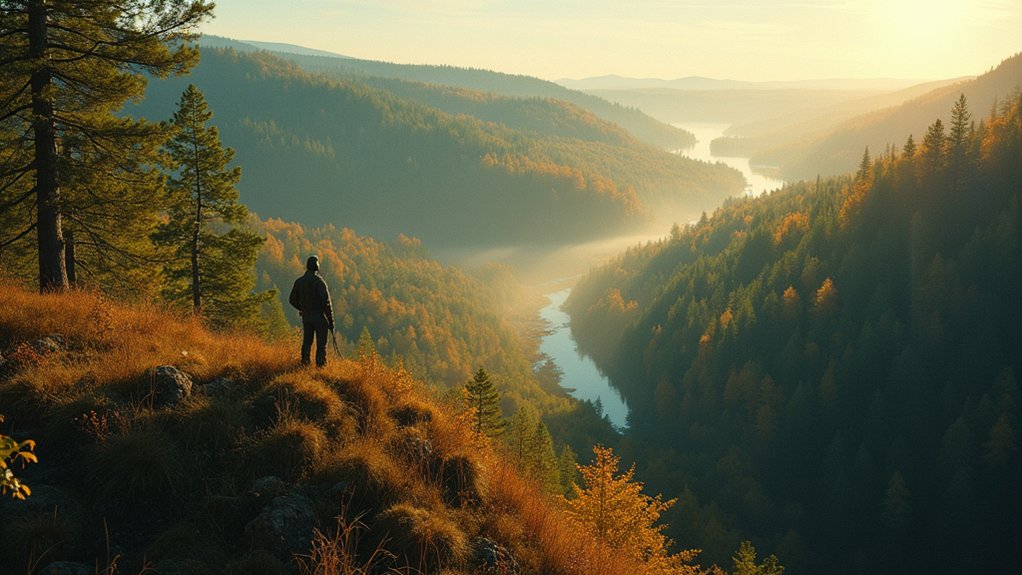Finding hunting land can feel overwhelming, but it doesn’t have to be. You’ll want to explore various resources and understand what makes a piece of land suitable for your needs. Location plays an essential role, but so do legal considerations and wildlife assessment. As you navigate this process, you’ll discover strategies that can lead to hidden gems. Let’s explore the best approaches to secure that perfect spot for your next hunt.
How to Find Hunting Land: Key Factors to Consider
When you’re searching for hunting land, it’s important to contemplate several key factors that can impact your experience.
First, consider the location—proximity to your home and accessibility can save you time and make trips more enjoyable.
Next, think about the terrain and habitat; diverse landscapes attract various game species. Water sources and food availability also play a vital role in wildlife presence.
Additionally, check local regulations regarding hunting seasons and permissible methods.
Finally, evaluate the land’s size and layout, as these factors influence your hunting strategy.
Prioritizing these elements will enhance your overall hunting adventure.
What Are the Best Resources for Finding Hunting Land?
How can you effectively discover the best hunting land? Start by utilizing online platforms like HuntStand and OnX Hunt, which offer maps and property details.
Local wildlife agencies often provide valuable information, so check their websites or contact them directly. Networking with fellow hunters can lead to hidden gems—join local hunting clubs or online forums.
Don’t forget about real estate listings, especially those focused on recreational properties. Additionally, consider reaching out to landowners directly; sometimes, they’re open to leasing their land.
Each resource can help you find the ideal spot for your next hunting adventure.
Why Is Location Important When Searching for Hunting Land?
Location plays an essential role in your success as a hunter, as it directly impacts the availability of wildlife and the overall experience. If you’re in an area with abundant game, you’re more likely to have successful hunts.
Additionally, the landscape and terrain can affect how you approach hunting; some locations offer better cover and vantage points. Proximity to your home is also vital, as it saves time and allows for more frequent trips.
Finally, consider local regulations and seasonal patterns in the area, as these can greatly influence your hunting opportunities. Choose wisely, and you’ll enhance your hunting adventures.
How to Evaluate Potential Hunting Properties
Finding the right spot for your hunting adventures involves more than just picking a desirable location; it requires a careful evaluation of potential properties.
Start by examining the terrain and cover types, as diverse landscapes attract various game. Look for water sources nearby, since animals need hydration. Check for signs of wildlife activity—tracks, droppings, or rubs indicate a healthy population.
Consider accessibility; you’ll want a property that’s easy to reach and navigate. Finally, think about neighboring land uses; areas with minimal disturbances are ideal.
What Legal Considerations Should You Know About Hunting Land?
Before you set out to hunt, it’s essential to understand the legal aspects surrounding hunting land. Ignoring these can lead to serious consequences, so make certain you’re informed.
Here are some key points to take into account:
- Property Ownership: Always verify who owns the land and confirm you have permission to hunt.
- Hunting Regulations: Familiarize yourself with local hunting laws, including season dates and bag limits.
- Licenses and Permits: Obtain the required licenses and permits for hunting in your area.
- Liability Issues: Understand liability concerns and think about liability insurance for added protection.
Stay informed to enjoy a safe hunting experience!
How to Network with Other Hunters for Hunting Land Opportunities
Many hunters find that networking with fellow enthusiasts can open doors to valuable hunting land opportunities.
Start by joining local hunting clubs or online forums to connect with like-minded individuals. Attend hunting expos or workshops to meet experienced hunters who might share tips or leads on available land.
Don’t hesitate to ask friends and family if they know of any potential spots. Building relationships is key; engage in conversations, share your experiences, and offer help when you can.
The more you network, the more likely you’ll discover hidden gems for hunting that you mightn’t find on your own.
What to Look for in Hunting Land Contracts or Agreements
As you connect with fellow hunters and gather information about potential hunting land, understanding the contracts or agreements that come with leasing or purchasing property is essential.
Here’s what to look for:
- Duration: Know how long the lease lasts and any renewal options.
- Access Rights: Check what access you have, including roads and parking.
- Liability: Understand who’s responsible for accidents or damages on the property.
- Restrictions: Be aware of any rules regarding hunting seasons, species, or methods.
Being informed helps guarantee you make the best decision for your hunting adventures.
How to Assess the Wildlife and Habitat on Hunting Land
How can you effectively evaluate the wildlife and habitat on potential hunting land?
Start by observing the landscape—look for diverse vegetation, which attracts various species. Check for signs of wildlife, like tracks, droppings, or bedding areas.
Assess water sources; ponds and streams are essential for attracting animals. Visit during different seasons to understand wildlife movement and habitat use.
Talk to local hunters or wildlife officials for insights about species presence and population health.
Finally, consider the land’s proximity to protected areas; these can enhance wildlife activity.
